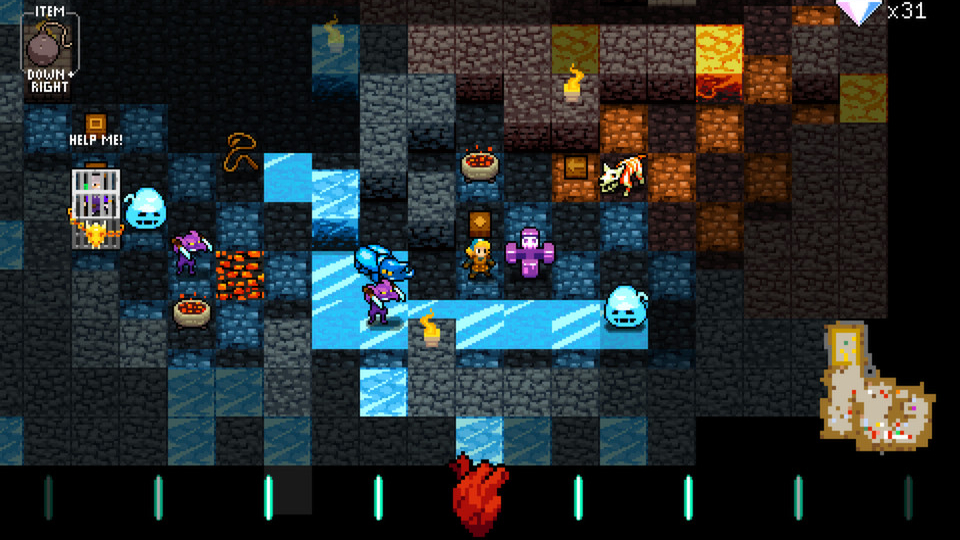I’ve been trying to learn music lately. Like, really learn it. It hasn’t been going well. Fortunately two recent games, Sentris and Crypt of the Necrodancer, stopped me from giving up altogether.
I have a bad habit of taking things I love as leisure activities and trying to turn them into more. I mean, look at my track record. I did it with goddamn video games. I turned a hobby dedicated to fun into my job. And now I’m trying to become good — actually halfway decent, objectively not eardrum-bursting — at music. Guitar and singing, because I really like those things and/or want to be a big ol’ walking cliche.
There are ups and downs to this practice. Nice part is, I get to take things I love with all my heart — every atrium and ventricle, even the emotionally closed off ones that need therapy — and do them more often. There is, however, also added pressure to make appreciable progress and just generally, you know, not suck. That’s where things get tough for me.
If I’m not careful, the pressure becomes a weight, a big ol’ vulture perched on my shoulders pecking at my passion for the things I do. I let that happen with music. Guitar, especially, has been a slow process, and sometimes I’ll go weeks without feeling like I’ve gotten much better. That’s frustrating. No longer is it this exercise in free-spirited creativity and improvisation. I have expectations now, and I hate myself for not living up to them.
Sometimes it’s really basic things, too. Like, “Jeez, Nathan, are you actually the shittiest person in the world at keeping rhythm? Could you be any clumsier at shifting between those two incredibly basic chords?” I hear that voice in my head, and slowly but surely I want to pick up my guitar less and less. It stops being a stress reliever and starts being a crackling conduit for the stuff.
Music, in these instances, stops being fun. And the longer this goes on, the more I forget music can be fun at all.
In a lot of ways, two games — Sentris and Crypt of the Necrodancer — have really helped remind me why I was so drawn to music in the first place. Both are rooted in music, but they abstract it to wildly different places.
Sentris is a soothingly paced (I guess you could say) puzzle game in which you assemble songs piece-by-piece, and Crypt of the Necrodancer is, um, the polar opposite. It’s a sometimes maddeningly frantic roguelike dungeon crawler in which your every move is set to a song. Miss a beat and you might lose your combo or not be able to make a move at all.
Both hit me in different ways. I recently spent a whole afternoon playing Sentris, having originally set out to just mess around for, like, 30 minutes or so. It’s one of those games, though, where you just kinda lose track of time while playing it. Technically speaking your goal is to fill certain coloured rectangular spaces on a radial interface with correspondingly coloured rectangles, but the rest is up to you.
So I sat there slotting in various sounds, barely even paying attention to whether or not I was close to “beating” a level. Each new rectangle I dropped yielded some new firework of noise, each automatically thrumming along to the rhythm. Drums, guitar, crazy ethereal synth noises — all sorts of stuff.
I was just there, making a thing. My brain wasn’t wandering into its usual jungle temple death trap of pressure and self-loathing. I got to be creative without worrying quite so much about failure. Say what you will about the notion of “fun” (or lack thereof) in less traditionally challenging games, but very-few-strings attached creativity is damn fun to me.

Crypt of the Necrodancer, meanwhile, reminded me that I can be musically creative under pressure too. While it’s possible to play with a DDR pad (and in Evan’s incredible pink pants), I’ve been playing on regular PC keyboard. Regardless, Necrodancer quickly ramps up its difficulty, and each floor of each location has a different rhythm.
That functions like a double-edged sword in a very different way than the game’s gleaming arsenal of double-edged swords, letting enemies attack more frequently, but also giving you more room to improvise if you really figure out a song. It took me ages to even beat the boss of Zone 1 and advance to Zone 2, but when I finally did I was sussing out rhythms within rhythms, figuring out how to double-time my actions and things like that.
Now I cannot stop playing, and it’s kinda become a problem.
Both games have offered me new, in some cases practically applicable means of interacting with music, and you know what? I’m on board with the whole “frequently practicing” thing again. I forgot how to relax and just enjoy making noises, my noises. They don’t always have to be good. I think good games are a lot like making music in that respect: win or lose, it’s much, much better if you just have fun with it.

Comments
2 responses to “How Two Great Games Kept Me From Hating Music”
Cheers. I’m struggling trying to learn the guitar as well. Might give these games a go for some motivation to keep me going.
Is it that the games make you passionate about learning music or do they make you passionate about hearing music? I mean either way is good but I think when you’re doing something like learning guitar there’s a lot of credence given to “here’s how you can be a pro in a week” methods and other miracle solutions. Just to be clear I think passion for music (playing or learning) is a super valuable thing to have when learning an instrument or learning to sing but if your passion for music extends to the video games about music and not to actually sitting down every day for x amount of time and playing the guitar then it’s not going to do you a lot of good (except inspiring you to play fun games more, but I meant in the guitar-learning sense)